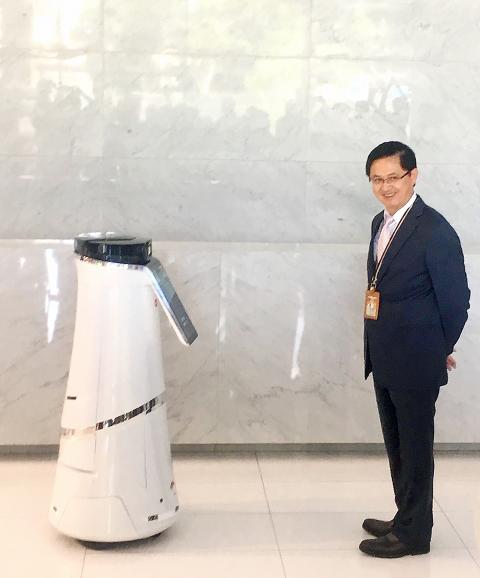Contract electronics manufacturer Pegatron Corp (和碩) yesterday unveiled a full line of artificial intelligence (AI)-infused concept products, which it said shows its ability to keep pace with rapidly evolving market trends and customer specifications.
The company is preparing for the “AI of everything” era as a tidal wave of technological advancement creates new possibilities and helps reinvigorate mature technologies, Pegatron chairman Tung Tzu-hsien (童子賢) said.
AI and the Internet of Things are expected to help add new features and improve the user experience for mature products, such as smartphones and laptops, Tung said during a product tour at the company’s headquarters in Taipei’s Guandu (關渡) area.

Photo: Chen Jou-chen, Taipei Times
Amid rising anticipation and an inventory ramp-up ahead of Apple Inc’s product launches in September, Tung sees stable growth across the supply chain in the second half of the year, he said.
It would be more worrying if there were a lack of new elements and improved value propositions, Tung said.
Pegatorn presented AI-enhanced robots for home and commercial use and a smart home security system, as well as a smart speaker and an augmented reality system.
It also unveiled an automotive dashboard, infotainment and communication solution designed to take advantage of the introduction of fifth-generation wireless technology (5G).
In the laptop segment, the company demonstrated its ability to make a fully saltwater resistant product, as well as new advances in materials and industrial design. It is particularly proud of its in-house neural network, which powers the voice command capabilities of the Martina II smart speaker.
Martina II is capable of processing voice commands in Mandarin, Hoklo (commonly known as Taiwanese) and Japanese, while most smart speakers by peers only cater to English speakers.
The voice command service is powered by Pegatron’s own neural network and does not rely on services provided by Google or Amazon, the firm said, adding that it can also process voice commands given in a mix of languages.
The smart speaker is equipped with a 3D sensing camera to detect different users and environmental conditions and adjust music playback, the company added.
While Taiwan has made headway in the AI race, efforts should be concentrated on developing applications as opposed to supplying hardware, Tung said.

CAUTIOUS RECOVERY: While the manufacturing sector returned to growth amid the US-China trade truce, firms remain wary as uncertainty clouds the outlook, the CIER said The local manufacturing sector returned to expansion last month, as the official purchasing managers’ index (PMI) rose 2.1 points to 51.0, driven by a temporary easing in US-China trade tensions, the Chung-Hua Institution for Economic Research (CIER, 中華經濟研究院) said yesterday. The PMI gauges the health of the manufacturing industry, with readings above 50 indicating expansion and those below 50 signaling contraction. “Firms are not as pessimistic as they were in April, but they remain far from optimistic,” CIER president Lien Hsien-ming (連賢明) said at a news conference. The full impact of US tariff decisions is unlikely to become clear until later this month

With an approval rating of just two percent, Peruvian President Dina Boluarte might be the world’s most unpopular leader, according to pollsters. Protests greeted her rise to power 29 months ago, and have marked her entire term — joined by assorted scandals, investigations, controversies and a surge in gang violence. The 63-year-old is the target of a dozen probes, including for her alleged failure to declare gifts of luxury jewels and watches, a scandal inevitably dubbed “Rolexgate.” She is also under the microscope for a two-week undeclared absence for nose surgery — which she insists was medical, not cosmetic — and is

GROWING CONCERN: Some senior Trump administration officials opposed the UAE expansion over fears that another TSMC project could jeopardize its US investment Taiwan Semiconductor Manufacturing Co (TSMC, 台積電) is evaluating building an advanced production facility in the United Arab Emirates (UAE) and has discussed the possibility with officials in US President Donald Trump’s administration, people familiar with the matter said, in a potentially major bet on the Middle East that would only come to fruition with Washington’s approval. The company has had multiple meetings in the past few months with US Special Envoy to the Middle East Steve Witkoff and officials from MGX, an influential investment vehicle overseen by the UAE president’s brother, the people said. The conversations are a continuation of talks that

Alchip Technologies Ltd (世芯), an application-specific integrated circuit (ASIC) designer specializing in artificial-intelligence (AI) chips, yesterday said that small-volume production of 3-nanometer (nm) chips for a key customer is on track to start by the end of this year, dismissing speculation about delays in producing advanced chips. As Alchip is transitioning from 7-nanometer and 5-nanometer process technology to 3 nanometers, investors and shareholders have been closely monitoring whether the company is navigating through such transition smoothly. “We are proceeding well in [building] this generation [of chips]. It appears to me that no revision will be required. We have achieved success in designing